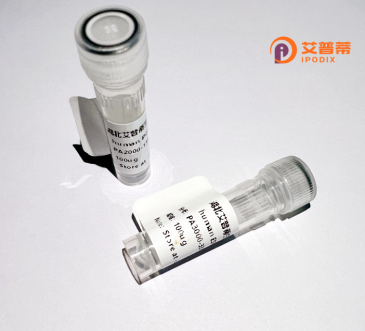
| 纯度 | >90%SDS-PAGE. |
| 种属 | Human |
| 靶点 | COLQ |
| Uniprot No | Q9Y215 |
| 内毒素 | < 0.01EU/μg |
| 表达宿主 | E.coli |
| 表达区间 | 1-445aa |
| 氨基酸序列 | MTGSSFSLAHLLIISGLLCYSAGCLALPSLDQKKRGGHKACCLLTPPPPPLFPPPFFRGGRSPLLSPDMKNLMLELETSQSPCMQGSLGSPGPPGPQGPPGLPGKTGPKGEKGELGRPGRKGRPGPPGVPGMPGPIGWPGPEGPRGEKGDLGMMGLPGSRGPMGSKGYPGSRGEKGSRGEKGDLGPKGEKGFPGFPGMLGQKGEMGPKGEPGIAGHRGPTGRPGKRGKQGQKGDSGVMGPPGKPGPSGQPGRPGPPGPPPAGQLIMGPKGERGFPGPPGRCLCGPTMNVNNPSYGESVYGPSSPRVPVIFVVNNQEELERLNTQNAIAFRRDQRSLYFKDSLGWLPIQLTPFYPVDYTADQHGTCGDGLLQPGEECDDGNSDVGDDCIRCHRAYCGDGHRHEGVEDCDGSDFGYLTCETYLPGSYGDLQCTQYCYIDSTPCRYFT |
| 分子量 | 72.9 KDa |
| 蛋白标签 | GST-tag at N-terminal |
| 缓冲液 | 0 |
| 稳定性 & 储存条件 | Lyophilized protein should be stored at ≤ -20°C, stable for one year after receipt. Reconstituted protein solution can be stored at 2-8°C for 2-7 days. Aliquots of reconstituted samples are stable at ≤ -20°C for 3 months. |
| 复溶 | Always centrifuge tubes before opening.Do not mix by vortex or pipetting. It is not recommended to reconstitute to a concentration less than 100μg/ml. Dissolve the lyophilized protein in distilled water. Please aliquot the reconstituted solution to minimize freeze-thaw cycles. |
以下是关于重组人COLQ蛋白的3篇参考文献示例,涵盖其结构、功能及疾病关联研究:
1. **文献名称**: "Collagen Q regulates acetylcholinesterase clustering at the neuromuscular junction"
**作者**: Ohno, K., Engel, A.G., et al.
**摘要**: 该研究通过重组人COLQ蛋白在HEK293细胞中的表达,揭示了COLQ作为乙酰胆碱酯酶(AChE)的锚定蛋白在神经肌肉接头处的关键作用,并证明其C末端结构域与突触基底膜成分的相互作用。
2. **文献名称**: "Expression and characterization of recombinant human collagen-like tail subunit (COLQ) of acetylcholinesterase"
**作者**: Donger, C., Krejci, E., et al.
**摘要**: 研究者利用哺乳动物表达系统成功生成功能性重组人COLQ蛋白,证实其与乙酰胆碱酯酶共表达时能够形成稳定的复合物,并促进酶在细胞表面的锚定,为先天性肌无力综合征的机制研究提供模型。
3. **文献名称**: "Mutant COLQ disrupts assembly of acetylcholinesterase in congenital myasthenic syndrome"
**作者**: Mihaylova, V., Salih, M.A., et al.
**摘要**: 本研究通过对比野生型与突变型重组COLQ蛋白的功能,发现COLQ基因突变导致其无法正常聚合乙酰胆碱酯酶,进而破坏神经肌肉信号传递,明确了部分先天性肌无力综合征的分子病理机制。
**备注**:若需实际文献,建议使用PubMed/Google Scholar等平台,以关键词"recombinant human COLQ"或"COLQ protein expression"检索近年论文。
Recombinant human COLQ protein is a key component in the structure and function of the neuromuscular junction. COLQ, or collagen-like tail subunit, serves as the collagenous anchor for acetylcholinesterase (AChE) at synaptic sites. It binds the catalytic subunits of AChE through its N-terminal domain and attaches them to the synaptic basal lamina via its collagen-like C-terminal domain. This localization is critical for efficient hydrolysis of acetylcholine (ACh) to terminate neurotransmission, ensuring proper muscle contraction. Mutations in the COLQ gene disrupt AChE assembly or anchorage, leading to congenital myasthenic syndromes (CMS), characterized by muscle weakness and fatigue. The recombinant form, typically produced in mammalian expression systems, retains functional domains and post-translational modifications, enabling studies on AChE biosynthesis, synaptic organization, and pathogenic mechanisms of CMS. It is also utilized to develop therapeutic strategies, such as protein replacement or gene therapy, for COLQ-related neuromuscular disorders. Research on recombinant COLQ contributes to understanding synapse-specific protein targeting and molecular interactions critical for neuromuscular signaling. Its applications extend to drug screening and disease modeling, bridging fundamental neuroscience with clinical translation.
×